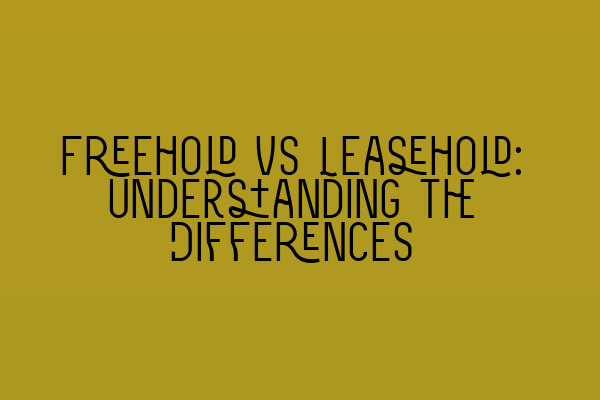Freehold vs Leasehold: Understanding the Differences
When it comes to property ownership, there are two primary forms – freehold and leasehold. Understanding the differences between these two can be crucial whether you are buying, selling, or renting a property. In this blog post, we will dive deep into the intricacies of freehold and leasehold, highlighting their key attributes, and shedding light on the pros and cons of each. So, let’s get started!
Freehold Properties:
A freehold property means that you own both the land and the building outright. You have absolute ownership and control over the property, and there is no time limit on your ownership rights. This form of ownership is often seen in detached houses and some commercial properties.
Advantages of Freehold Properties:
1. Complete Ownership: With a freehold property, you have complete control and ownership rights, giving you the freedom to make any alterations or renovations as you see fit without seeking permission from anyone else.
2. No Ground Rent or Service Charges: Unlike leasehold properties, freehold properties do not require you to pay ground rent or service charges to a landlord. This can result in cost savings and a greater sense of financial stability.
Disadvantages of Freehold Properties:
1. Greater Responsibility: As a freehold property owner, you are responsible for all maintenance and repairs. This includes any costs associated with the structural integrity of the building, external repairs, and utility connections.
2. Limited Legal Assistance: Resolving disputes involving freehold properties can be more complicated, as there is no lease agreement to refer to for guidance. Therefore, it is essential to seek legal advice to ensure your rights are protected.
Leasehold Properties:
A leasehold property means that you have a temporary right to use and occupy the property, typically for a fixed period of time. You do not own the land; instead, you enter into a lease agreement with the freeholder, also known as the landlord. Leasehold properties are commonly found in apartments, flats, and some commercial properties.
Advantages of Leasehold Properties:
1. Lower Initial Costs: Leasehold properties can be more affordable upfront as the purchase price only covers the leasehold interest, not the land. This can be an attractive option for first-time buyers or those with a limited budget.
2. Shared Maintenance Responsibility: In a leasehold property, the landlord is usually responsible for maintaining the common areas and building structure, reducing your maintenance burdens.
Disadvantages of Leasehold Properties:
1. Limited Control: As a leaseholder, you have to adhere to certain rules and regulations set by the landlord. This can range from restrictions on pets and property alterations to limitations on subletting.
2. Rising Ground Rent and Service Charges: Leaseholders are often required to pay regular ground rent and service charges to the landlord. These charges can increase over time, potentially making the property less affordable in the long run.
In conclusion, the choice between freehold and leasehold properties depends on your specific circumstances, financial capabilities, and personal preferences. If you value complete ownership and control, freehold properties might be the right choice for you. On the other hand, if you are looking for a more affordable option and don’t mind some restrictions, leasehold properties could be a viable alternative.
To further enhance your understanding and knowledge of property law and contracts, we recommend checking out these related articles:
– Parties in a Contract: Rights and Responsibilities
– Unveiling Duress and Undue Influence in Contracts
– Essentials of Consideration: Understanding the Backbone of Contracts
– Express and Implied Terms in Contracts: Decoding Agreement Components
– Breach of Contract: Remedies for Contractual Violations
These articles will provide you with valuable insights into the various aspects of contracts, rights, and responsibilities, helping you navigate the intricate world of property law with confidence.
Remember, whether you choose freehold or leasehold, it is always crucial to consult a qualified solicitor specializing in property law to ensure a smooth and legally sound transaction. At SQE Property Law & Land Law, our team of experienced solicitors is ready to assist you every step of the way. Contact us today to learn more about how we can help you with your property needs.
